Engine Classics: Best Carb For Chevy 305, 327 & 283
Stylethority is reader-supported. When you buy through links on the site, we may earn a commission.
Decades might have passed, but these Chevy beauties are not a thing of the past. Both the Chevy 305 and 327, as well as their little cousin – the 283 are popular still.
With a little bit of maintenance, you can re-live the good ol’ days of classic engines. Plugging the right carburetor is especially crucial for these three models, though.
Let’s start with the most optimal carb picks for each engine type.
➥➥ Best carburetor for Chevy 305: Go with the Edelbrock 1405 600 CFM for a milder setup/balanced ride profile. For a more performance-focused setup or a 305 V8, I’d recommend the fantastic Holley Speed Demon 625 CFM.
Optimal CFM range: 550-650.
➥➥ Best carb for Chevy 327: If you want to conquer the tracks, grab a 4150 Holley Street Avenger 670 CFM. If you want a mild/cruising 327, stick to the Edelbrock 1405 Performer again.
Optimal CFM range: 600-670.
➥➥ Best carburetor for Chevy 283: The smaller cousin is humble in terms of CFM. For cruising, stick to Holley 4160 390 CFM. If you want to go mild with a pinch of track action, this Edelbrock 1403 500 CFM is the optimal choice.
Optimal CFM range: 390-500.
| Product | Image | ||
|---|---|---|---|
|
Spotlight for cruising Chevy 305 & 327
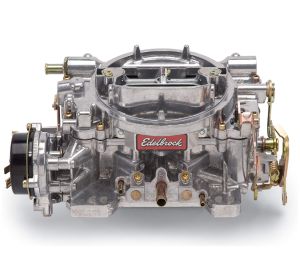
|
Edelbrock 1405 Performer
|
Check Latest Prices |
Important note: You can swap the 1405 for the 1406 Performer too. The difference is in the choke (1405 has a manual choke), and the jetting. This thread gives some extra info on the intricate differences.
You won’t see me recommending any 700+ CFM options in general.
Why? Because neither engine handles that range well – and aside from extensive gas usage (unneeded), you don’t benefit much.
We have plenty to talk about – use the Table of Contents to navigate to your preferred section:
The two main contenders for Chevy 305 carbs
305 engines are pretty versatile. You can fit not only the Holley or Edelbrock classics, but they work with Quadrajet (OEM on some years) or Rochester carbs as replacements too.
In my opinion – shared by many hotrodders, Holley and Edelbrock have become staples for a reason.
For the Chevy 305, we’re looking at the Edelbrock 1405 (or #1406 if you prefer an electric choke) on one hand. On the other, there’s the 625 CFM Holley Speed Demon.
Here are a few quick notes on what makes each one stand out:
| Product | Image | ||
|---|---|---|---|
|
For Carefree Easy Cruising

|
Edelbrock 1405 Performer
|
Check Prices & Fit |
| Product | Image | ||
|---|---|---|---|
|
For the performance-oriented
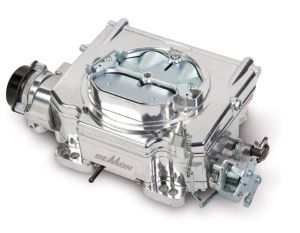
|
Holley Speed Demon
|
Check Prices & Fit |
Beyond this difference in intended ride style, both of these carbs share a lot of manufacturing/fitment common points. Namely:
- Both come with a single-feed fuel inlet. This allows for a very easy installation process.
- Both are 4-barrel carburetors (quite common with modern carbs).
- Both come with a square bore bolt pattern.
As I pointed out, there is a difference in how these carbs approach tuning. If you’re the set-and-forget type who prefers casual cruising, snag the Edelbrock.
The Holley has an electric choke, as does the Edelbrock 1406. The #1405 keeps to a manual choke.
If you prefer fine-tuning things and are a fan of crisper, more oomph! throttle response, the Speed Demon lives up to its name.
Both carbs are optimal for your fuel economy too. Anything above 650 CFM, and you’ll be wasting gas.
In case you still want a 750 CFM beast, check the Edelbrock 1411 Performer.
I’d like to reiterate that in most cases, I don’t recommend going that far though. This is a small block engine we’re talking about, not its 454 big block brother which demands bigger carbs.
327 Chevy options, depending on horsepower
With the Chevy 327, there might be some specific stock differences between the different horsepower models.
A good example is the 350 HP variation of the 327. This one had a stock Carter AFB on it. As Edelbrock is a successor to Carter carbs, either of the 1405 or 1406 Performers should be a direct fit.
You also have the 365 HP representative of the 327 engine. This one ran on a stock Holley 2818 – grabbing a 670 CFM Street Avenger as a replacement is a more reasonable choice.
Once again, here’s a quick comparison between the two best choices:
| Product | Image | ||
|---|---|---|---|
|
For lower HP stock 327

|
Edelbrock 1405 Performer
|
Check Prices & Fit |
| Product | Image | ||
|---|---|---|---|
|
For higher HP 327 setups
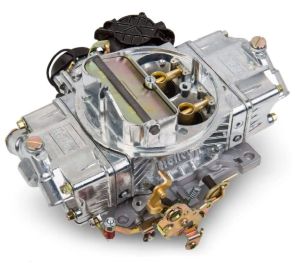
|
Holley 4150 Street Avenger
|
Check Prices & Fit |
Performance-wise, the Street Avenger follows my notes on the Speed Demon for Chevy 305:
- More sophisticated (but complicated) tuning
- Amped up performance on the racetrack
- Generally a little bit more complicated for carb beginners and better for veterans/experienced hotrodders.
With 327 models, I really recommend you stick to vacuum secondaries on your carburetor.
Thankfully, both the Edelbrock and Holley listed above come with vacuums. Mechanicals don’t really mesh that well with a stock Chevy 327. They’re doable, but a total pain in the neck to tinker around with.
Picks for Chevy 283, the smaller cousin
The Chevy small-block 283 engine might look ‘cute’ to some, but it still packs a punch. Adjusting to its lower horsepower, size, and manufacturing specifications, you’ll need a lower CFM carb.
I actually have three options for you here, with one of them being a bit of an overkill for the extreme racing types.
The best pick for casual cruising would be the small 390 CFM Holley 4160 model. I know Holley put a mild race stamp of approval on it, but that’s not really true. You’d be better off sticking to the streets only with this neat tiny carb.
It fits both the V8 engines, as well as 6-cylinder setups. You have an electric choke, vacuum secondaries, and the typical Holley square bore flange.
The dichromate finish allows for durability over time. The alloy is also more ethanol-resistant than the usual AFB builds coated in aluminum, which is a good perk to have too.
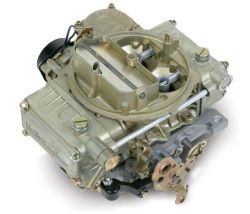
390 CFM for comfy cruising. made of durable alloy that will last for long.
For a balanced performance, including mild racing, I’d suggest the 500 CFM Edelbrock 1403 carburetor. A part of the Performer series, it’s basically Edelbrock 1405’s little brother.
As such, it shares the same manufacturing traditions and tuning specifics.
One thing very notable about the 1403 Edelbrock is its very smooth acceleration. Definitely a must if you prefer more comfortable rides, be it on the racetrack or when cruising around.
The smoothest, most mellow way to enjoy a small-block engine – that should be the motto of the 500 CFM carb for Chevy 283. The same 1403 is a staple for small-block Ford engines, too.
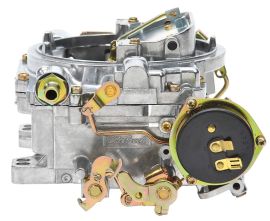
500 CFM with an especially smooth throttle response considering the higher performance levels. Perfect for stock or modded Chevy 283.
Last but not least, I’ll introduce the 600 CFM Holley 0-80457S. If you’ve decided to test the limits of your small-block Chevy 283, that’s a good carb to tinker with.
Once again, I don’t really think a 283 will run optimally on 600 CFM. Maybe a modded engine with some additional extras configured, but otherwise, I don’t really recommend it.
There are some people who have done this, though, usually with the idea of going for more heated racing adventures. This is a pure strip and track performance carburetor, specializing in cold starts and even more meticulous tuning options.
One standout thing here is the looks. This specific Holley carb might just be the shiniest Chevy carb you’ll ever see:
It’s obviously on purpose. With the 0-80457S, you’ll be not only conquering tracks but also evoking the envy of your track competitors.
Let’s face it – Holley made the perfect powerful carb for small-block engines and wanted to flaunt its high-end performance with a shiny coating on top.
And you know what…it works perfectly. This is a 600 CFM gem, but once again I advise casual users to steer away from it.
Two notes on these retro beauties
Note #1: Expanding on why you don’t need any 650+ CFM carbs on these three engines.
OK, look – true racing enthusiasts might need a 750 CFM monster. For most casual enjoyers, though, anything above 650 is overkill. Twice so for the smallest 283 Chevy.
What’s the actual harm?
You’ll be just wasting gas, that’s it. In some applications, your engine might also start choking as if you were piling sand on it all the time.
Note #2: You don’t need to fuss over barrel size or bore shape inconsistencies.
Your Chevy has a 2-barrel intake manifold, but you need to change it to a 4-barrel intake manifold?
You have adapters for that – I recommend the Mr. Gasket Carb adapter kit. It’s the community’s go-to brand for this procedure.
Having an issue with bores? This can happen quite often.
Especially for some Chevy 305 engines, you’d have a Quadrajet stock carb which is a square bore. You can change it to a spread bore for your replacement by using this carburetor adapter plate:
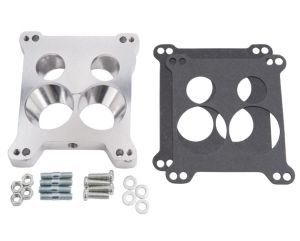
Makes sure you can use any carb on your intake. Comes with hardware and gaskets included.
This thin, but durable adapter plate makes sure you can use any carburetor on your intake. Its aluminum construction makes it lightweight, heat-resistant, and an overall joy to work with.
To sum it all up
This list is not extensive per se, but it is a rundown on the most optimal choice for the majority of setups.
I’m particularly shocked to see some sites recommend superfluous CFM-rated carbs too – hopefully, I made a strong case for why I think these are overkill for most drivers.
I’d be glad to hear you out – what brands have you run on your small block Chevy? Did you prefer a Quadratec or an Edelbrock? Or a Holley enthusiast?
Drop a comment and let me know!
Also, speaking of classics: I’ve written about another Chevy beauty, the one and only big block 454 and its spark plugs.
Some people are more fond of small block engines. In this case, you can check out my guide to 799 vs 243 heads. A lot of people have misconceptions about these LS-engine cylinders. I’ve cleared up some inaccuracies.
- Woolx vs Smartwool: Discussing Some Details - October 4, 2023
- Best Struts For Honda Accord & Element: What Works - September 22, 2023
- Bilstein vs Monroe Shocks: My Opinion On What Works Best - September 19, 2023

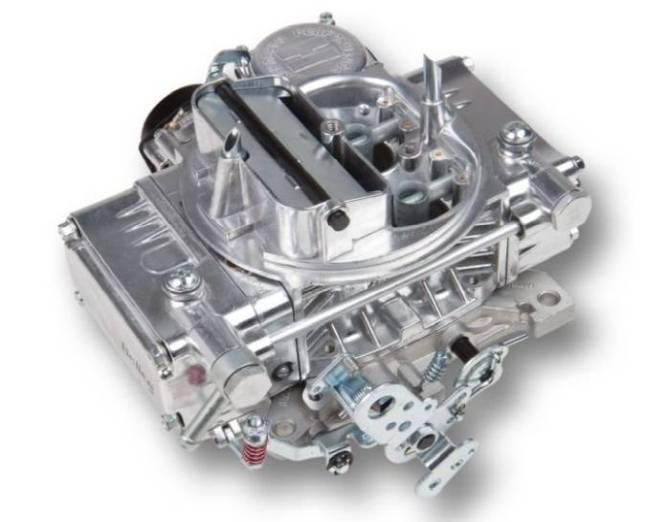


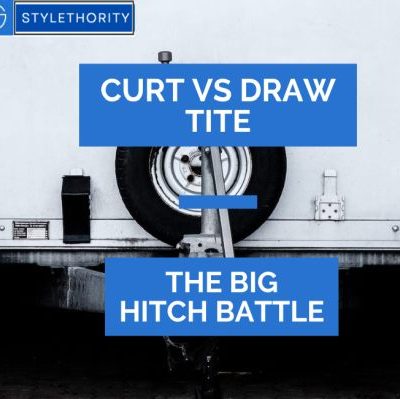
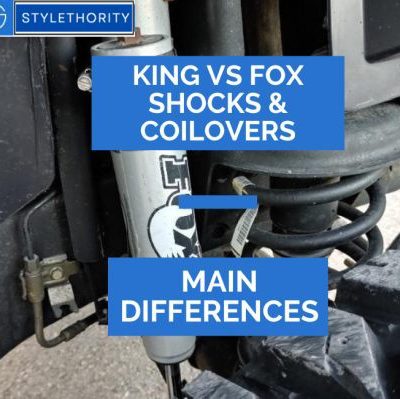
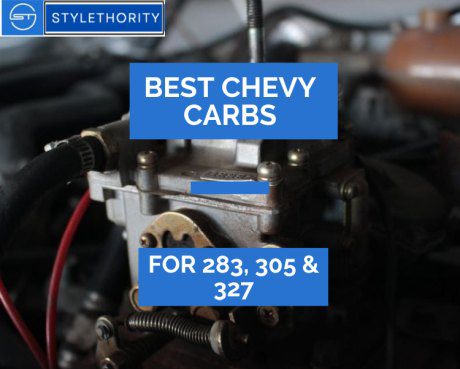
Can a edelbrock 700 jets be charged out , to make more of a cruise driver